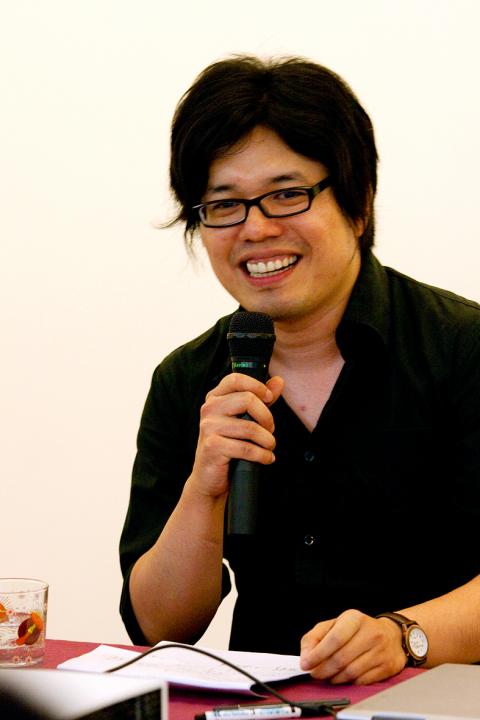While the Golden Horse Awards (金馬獎) handed out accolades last month to high achievers in the movie industry, the Golden Shrimp Awards (金蝦獎), a new endeavour that aims to honor the worst of the worst, has released its roll call of shame.
The word “shrimp” (hsia, 蝦) was chosen because it is a Mandarin homophone for blind (瞎), which can also mean thoughtless and stupid. For the first edition, four jurors, including noted film critics Ryan Cheng (鄭秉泓) and Regina Ho (何瑞珠), chose nominees from Chinese-language films released between October last year and September this year in Taiwan.
Netizens were asked to cast votes, and the full results will be made public today.

Photo: Bloomberg
Among the contenders, Seediq Bale 2 (賽德克‧巴萊下) picked up the Worst Moment Award for its unpolished CGI effects, Hong Kong director Christopher Sun (孫立基) won the Worst Director Award for his erotic 3D film 3D Sex & Zen: Extreme Ecstasy (3D肉蒲團之極樂寶鑑), and Taiwanese director Chu Yen-ping (朱延平) bagged the Worst Film of the Year Award for his Just Call Me Nobody (大笑江湖).
Backed by government funding of NT$20 million, Just Call Me Nobody is a dreadful movie full of embarrassingly dated jokes. Its box office takings in Taiwan amounted to about NT$1.4 million.
Films funded by government subsidies did particularly well in the Golden Shrimp Awards.

Photo courtesy fo Regina Ho
“I have reviewed Taiwanese movies [for the past decade], and each year I come across lots of terrible movies subsidized by the government. The same thing happens year after year. And I think, not as a film critic, but as a taxpayer, that the whole situation should be subject to public debate and discussion,” said Ho, a senior reporter at the CTI Television Incorporation (中天電視公司) and film critic who writes for publications including Next Magazine (壹週刊) and Eye-Movie (台灣電影筆記).
According to statistics compiled by Ho from the Government Information Office (GIO, 新聞局), other poorly performing subsidized films include Who Is the Murder (人不是我殺的, 2004), Wolf (狼, 2005) and Down to Love (好想談個戀愛, 2006). Who Is the Murder broke the box office record for the lowest grossing film of all time, raking in some NT$3,960 in Taipei.
Meanwhile, The Treasure Hunter (刺陵), released in 2010, fared a little better. But in addition to a production subsidy of NT$25 million, taxpayers also paid NT$4 million to promote the cinematic blooper, which stars Jay Chou (周杰倫) and Lin Chi-ling (林志玲).

Photo courtesy of Ryan Cheng
“You don’t have to be a reporter or a film professional to see that there is something very wrong with the system,” Ho said.
Cheng says that subsidies should aim to encourage “diversity,” and not be used to make repetitive genre flicks such as Dancing Without You (背著你跳舞), The Tempests of First Love (初戀風暴), Will You Still Love Me (你是否依然愛我) and Me, 19 (我,19歲), all of which were nominated for Golden Shrimp Awards.
Ho, on the other hand, believes that subsidies should be scrapped altogether.
“Movies are products. If you want to expand the market, you don’t give money; you invest … People in the industry have to find the market themselves. If there are funds for screening and marketing, they don’t even need to have audiences,” she said.

That US assistance was a model for Taiwan’s spectacular development success was early recognized by policymakers and analysts. In a report to the US Congress for the fiscal year 1962, former President John F. Kennedy noted Taiwan’s “rapid economic growth,” was “producing a substantial net gain in living.” Kennedy had a stake in Taiwan’s achievements and the US’ official development assistance (ODA) in general: In September 1961, his entreaty to make the 1960s a “decade of development,” and an accompanying proposal for dedicated legislation to this end, had been formalized by congressional passage of the Foreign Assistance Act. Two

March 31 to April 6 On May 13, 1950, National Taiwan University Hospital otolaryngologist Su You-peng (蘇友鵬) was summoned to the director’s office. He thought someone had complained about him practicing the violin at night, but when he entered the room, he knew something was terribly wrong. He saw several burly men who appeared to be government secret agents, and three other resident doctors: internist Hsu Chiang (許強), dermatologist Hu Pao-chen (胡寶珍) and ophthalmologist Hu Hsin-lin (胡鑫麟). They were handcuffed, herded onto two jeeps and taken to the Secrecy Bureau (保密局) for questioning. Su was still in his doctor’s robes at

Last week the Democratic Progressive Party (DPP) said that the budget cuts voted for by the China-aligned parties in the legislature, are intended to force the DPP to hike electricity rates. The public would then blame it for the rate hike. It’s fairly clear that the first part of that is correct. Slashing the budget of state-run Taiwan Power Co (Taipower, 台電) is a move intended to cause discontent with the DPP when electricity rates go up. Taipower’s debt, NT$422.9 billion (US$12.78 billion), is one of the numerous permanent crises created by the nation’s construction-industrial state and the developmentalist mentality it

Experts say that the devastating earthquake in Myanmar on Friday was likely the strongest to hit the country in decades, with disaster modeling suggesting thousands could be dead. Automatic assessments from the US Geological Survey (USGS) said the shallow 7.7-magnitude quake northwest of the central Myanmar city of Sagaing triggered a red alert for shaking-related fatalities and economic losses. “High casualties and extensive damage are probable and the disaster is likely widespread,” it said, locating the epicentre near the central Myanmar city of Mandalay, home to more than a million people. Myanmar’s ruling junta said on Saturday morning that the number killed had